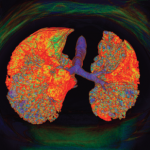 Many patients with rheumatoid arthritis (RA) experience clinical or subclinical lung involvement and approximately 10% will develop interstitial lung disease (ILD). RA with ILD resembles idiopathic pulmonary fibrosis, which has led scientists to question whether the two conditions have a similar underlying pathophysiology. The pathogenesis of idiopathic pulmonary fibrosis may be the result of abnormalities in surfactant secretion predisposition to cell senescence, as well as interference with ciliary clearance. Past research has found parallels in RA patients who frequently have shortened telomeres and patients with ILD who not only carry risk alleles for telomere shortening, but also have more accelerated telomere shortening.
Many patients with rheumatoid arthritis (RA) experience clinical or subclinical lung involvement and approximately 10% will develop interstitial lung disease (ILD). RA with ILD resembles idiopathic pulmonary fibrosis, which has led scientists to question whether the two conditions have a similar underlying pathophysiology. The pathogenesis of idiopathic pulmonary fibrosis may be the result of abnormalities in surfactant secretion predisposition to cell senescence, as well as interference with ciliary clearance. Past research has found parallels in RA patients who frequently have shortened telomeres and patients with ILD who not only carry risk alleles for telomere shortening, but also have more accelerated telomere shortening.
Recently, scientists performed genome-wide association studies to identify common genetic variants that may contribute to the development of idiopathic pulmonary fibrosis. They identified a gain-of-function promoter variant in MUC5B (rs35705950) that accounts for approximately 30–35% of the genetic risk for the development of idiopathic pulmonary fibrosis.
The parallels between idiopathic pulmonary fibrosis and ILD have led Pierre-Antoine Juge, MD, a rheumatologist at Bichat-Claude Bernard Hospital, Paris, and colleagues to question whether this risk factor for idiopathic pulmonary fibrosis may also contribute to the risk of ILD among RA patients. In their latest research, they found the promoter variant in MUC5B (rs35705950) is not only associated with RA with complicating ILD, but is also specifically associated with evidence of unusual interstitial pneumonia on imaging. Their results were published on Oct. 20 in the New England Journal of Medicine.¹
The investigators first used a discovery population to compare patients with RA and ILD to unaffected controls. From this population, they determined the minor allele of the MUC5B promoter variant was associated with disease. They next analyzed a multi-ethnic case series and found the variant was significantly over-represented among patients with RA and ILD relative to unaffected controls. When researchers looked within the RA population, they found an association between the MUC5B promoter variant and an increased risk of ILD. However, they note the variant was not associated with RA diagnosis alone.
The investigators found the effect of the promoter variant in ILD development for RA patients was similar in magnitude and direction to that observed for patients with idiopathic pulmonary fibrosis. Moreover, the relationship between the MUC5B promoter variant and RA with ILD appeared to be specific to the usual interstitial pneumonia (UIP) pattern as seen by high-resolution CT scan. Researchers also found TOLLIP rs5743890 and IVD rs2034650 may contribute to the risk of RA with ILD. All told, their findings suggest that RA with ILD is a complex genetic phenotype.

